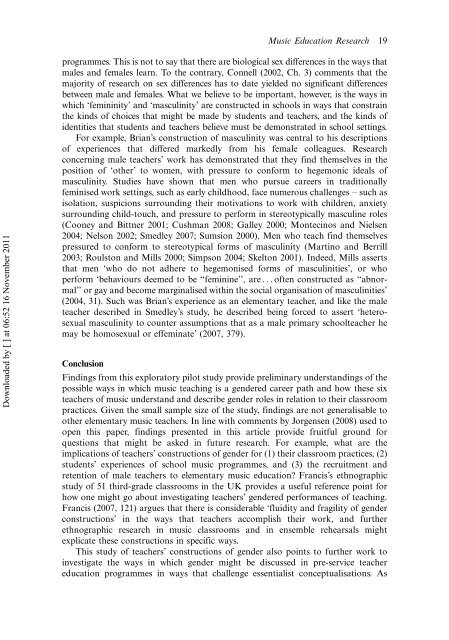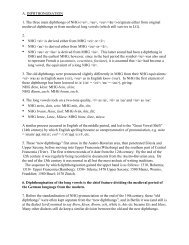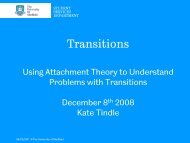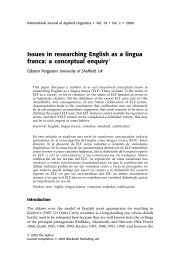Music teachers' constructions of gender in elementary education
Music teachers' constructions of gender in elementary education
Music teachers' constructions of gender in elementary education
Create successful ePaper yourself
Turn your PDF publications into a flip-book with our unique Google optimized e-Paper software.
Downloaded by [ ] at 06:52 16 November 2011<br />
<strong>Music</strong> Education Research 19<br />
programmes. This is not to say that there are biological sex differences <strong>in</strong> the ways that<br />
males and females learn. To the contrary, Connell (2002, Ch. 3) comments that the<br />
majority <strong>of</strong> research on sex differences has to date yielded no significant differences<br />
between male and females. What we believe to be important, however, is the ways <strong>in</strong><br />
which ‘fem<strong>in</strong><strong>in</strong>ity’ and ‘mascul<strong>in</strong>ity’ are constructed <strong>in</strong> schools <strong>in</strong> ways that constra<strong>in</strong><br />
the k<strong>in</strong>ds <strong>of</strong> choices that might be made by students and teachers, and the k<strong>in</strong>ds <strong>of</strong><br />
identities that students and teachers believe must be demonstrated <strong>in</strong> school sett<strong>in</strong>gs.<br />
For example, Brian’s construction <strong>of</strong> mascul<strong>in</strong>ity was central to his descriptions<br />
<strong>of</strong> experiences that differed markedly from his female colleagues. Research<br />
concern<strong>in</strong>g male teachers’ work has demonstrated that they f<strong>in</strong>d themselves <strong>in</strong> the<br />
position <strong>of</strong> ‘other’ to women, with pressure to conform to hegemonic ideals <strong>of</strong><br />
mascul<strong>in</strong>ity. Studies have shown that men who pursue careers <strong>in</strong> traditionally<br />
fem<strong>in</strong>ised work sett<strong>in</strong>gs, such as early childhood, face numerous challenges such as<br />
isolation, suspicions surround<strong>in</strong>g their motivations to work with children, anxiety<br />
surround<strong>in</strong>g child-touch, and pressure to perform <strong>in</strong> stereotypically mascul<strong>in</strong>e roles<br />
(Cooney and Bittner 2001; Cushman 2008; Galley 2000; Montec<strong>in</strong>os and Nielsen<br />
2004; Nelson 2002; Smedley 2007; Sumsion 2000). Men who teach f<strong>in</strong>d themselves<br />
pressured to conform to stereotypical forms <strong>of</strong> mascul<strong>in</strong>ity (Mart<strong>in</strong>o and Berrill<br />
2003; Roulston and Mills 2000; Simpson 2004; Skelton 2001). Indeed, Mills asserts<br />
that men ‘who do not adhere to hegemonised forms <strong>of</strong> mascul<strong>in</strong>ities’, or who<br />
perform ‘behaviours deemed to be ‘‘fem<strong>in</strong><strong>in</strong>e’’, are ...<strong>of</strong>ten constructed as ‘‘abnormal’’<br />
or gay and become marg<strong>in</strong>alised with<strong>in</strong> the social organisation <strong>of</strong> mascul<strong>in</strong>ities’<br />
(2004, 31). Such was Brian’s experience as an <strong>elementary</strong> teacher, and like the male<br />
teacher described <strong>in</strong> Smedley’s study, he described be<strong>in</strong>g forced to assert ‘heterosexual<br />
mascul<strong>in</strong>ity to counter assumptions that as a male primary schoolteacher he<br />
may be homosexual or effem<strong>in</strong>ate’ (2007, 379).<br />
Conclusion<br />
F<strong>in</strong>d<strong>in</strong>gs from this exploratory pilot study provide prelim<strong>in</strong>ary understand<strong>in</strong>gs <strong>of</strong> the<br />
possible ways <strong>in</strong> which music teach<strong>in</strong>g is a <strong>gender</strong>ed career path and how these six<br />
teachers <strong>of</strong> music understand and describe <strong>gender</strong> roles <strong>in</strong> relation to their classroom<br />
practices. Given the small sample size <strong>of</strong> the study, f<strong>in</strong>d<strong>in</strong>gs are not generalisable to<br />
other <strong>elementary</strong> music teachers. In l<strong>in</strong>e with comments by Jorgensen (2008) used to<br />
open this paper, f<strong>in</strong>d<strong>in</strong>gs presented <strong>in</strong> this article provide fruitful ground for<br />
questions that might be asked <strong>in</strong> future research. For example, what are the<br />
implications <strong>of</strong> teachers’ <strong>constructions</strong> <strong>of</strong> <strong>gender</strong> for (1) their classroom practices, (2)<br />
students’ experiences <strong>of</strong> school music programmes, and (3) the recruitment and<br />
retention <strong>of</strong> male teachers to <strong>elementary</strong> music <strong>education</strong>? Francis’s ethnographic<br />
study <strong>of</strong> 51 third-grade classrooms <strong>in</strong> the UK provides a useful reference po<strong>in</strong>t for<br />
how one might go about <strong>in</strong>vestigat<strong>in</strong>g teachers’ <strong>gender</strong>ed performances <strong>of</strong> teach<strong>in</strong>g.<br />
Francis (2007, 121) argues that there is considerable ‘fluidity and fragility <strong>of</strong> <strong>gender</strong><br />
<strong>constructions</strong>’ <strong>in</strong> the ways that teachers accomplish their work, and further<br />
ethnographic research <strong>in</strong> music classrooms and <strong>in</strong> ensemble rehearsals might<br />
explicate these <strong>constructions</strong> <strong>in</strong> specific ways.<br />
This study <strong>of</strong> teachers’ <strong>constructions</strong> <strong>of</strong> <strong>gender</strong> also po<strong>in</strong>ts to further work to<br />
<strong>in</strong>vestigate the ways <strong>in</strong> which <strong>gender</strong> might be discussed <strong>in</strong> pre-service teacher<br />
<strong>education</strong> programmes <strong>in</strong> ways that challenge essentialist conceptualisations. As

















